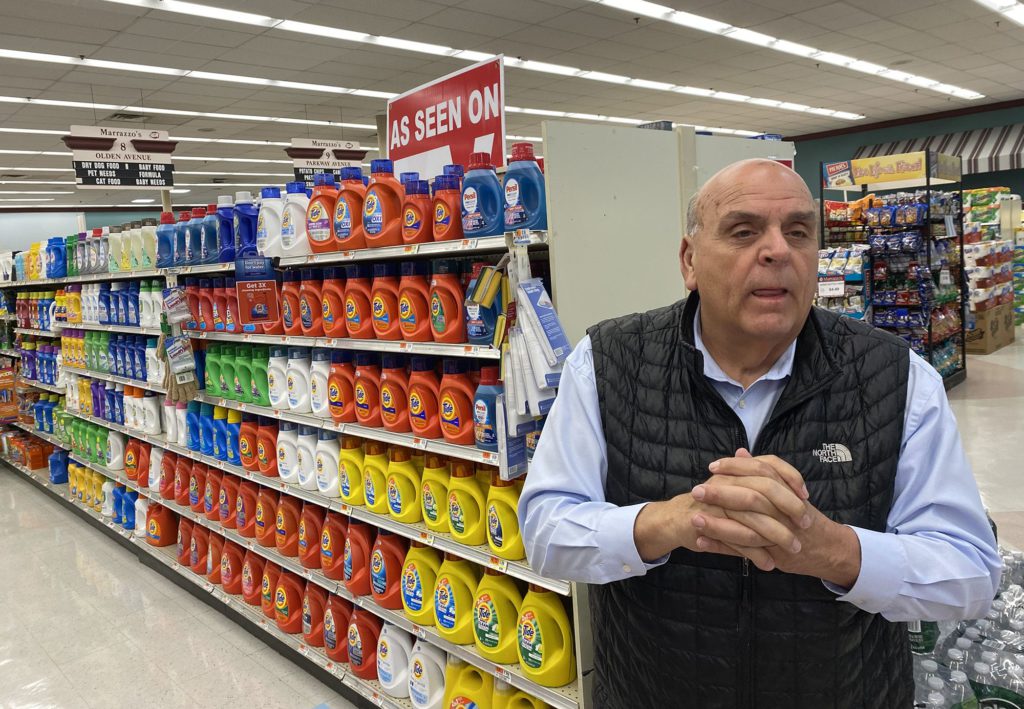(Bloomberg) — New Jersey will become the first state to ban both plastic and paper bags on Wednesday, leaving companies and shoppers to find creative workarounds to get their groceries home.
ShopRite, with more than 100 New Jersey stores, will charge a flat $1.50 per order for reusable bags. Instacart Inc., which fulfills shoppers’ lists for Aldi Inc., Lidl Ltd., CVS Health Corp. and others, said it will charge a flat bag fee, but didn’t specify the cost.
Amazon.com Inc.’s Whole Foods Markets Inc. — which dropped plastic bags nationally more than a decade ago — will pack those orders in reusable bags, for which it is “not currently charging any additional fees,” the company said in an email. The Wawa Inc. convenience-store chain will give away 1,000 reusable bags at each of its 272 New Jersey locations starting on Wednesday.
Governor Phil Murphy, a Democrat who took office in 2018, pledged to make an environmental leader of New Jersey, the most densely populated U.S. state and the nation’s top location for toxic Superfund sites, with 113. The law he signed in November 2020 restricts most grocery and other stores from giving away or even selling paper or plastic single-use bags. No other U.S. state has banned paper bags, though some require recycled content or per-bag consumer fees of a few cents, at times channeled to pollution-control programs.
New Jersey may not be alone for long: Some studies have shown that paper, though easily recycled, can sap more energy and raw materials than plastic. Reusable bags, too, have drawbacks, as cotton versions are soil-, fertilizer-, and manufacturing-intensive, and synthetic types often rely on fossil fuels.
The 100 billion plastic bags used in the U.S each year require 12 million gallons of oil to manufacture, according to EarthDay.org, a Washington-based non-profit environmental group.
Places that outlawed plastic have seen use drop dramatically. California, the first state to ban single-use bags in 2016, cut plastic carryout bag use by 20,000 tons (18 million kilograms) a year, according to research by University of Sydney economist Rebecca Taylor. But that figure was offset by a 120% increase in sales of small trash-bin liners as consumers who had re-purposed single-use bags filled the void.
‘Bring a Receptacle’
Days before the ban, some New Jersey grocery stores had empty plastic-bag holders at checkout lines and signs warning customers of the upcoming change. “Please bring a receptacle for your vehicle if you would like your items contained,” one sign read.
Target Inc. is “transitioning to a bag-free experience” in its 48 New Jersey stores, encouraging shoppers to bring their own or buy reusables, said spokeswoman Liz Hancock in an email. “Target gives guests a five-cent discount for each reusable bag used at all of our stores.”
Sam Marrazzo, making an example of plastic- and cardboard-packaged laundry detergent in aisle 7 of his Marrazzo’s Market grocery store in Ewing, New Jersey, questioned the bag policy: “Banning bags is saving the environment how, exactly?”
Marrazzo customers like Kay Trainor, a 79-year-old retired artist from Titusville said she’d switch to garbage bags. “I’m going to have to buy Hefty,” said Trainor, who reuses the free shopping bags to dispose of her cats’ waste.
At the end of New Jersey’s “Paper or plastic?” retail era, Marrazzo says he’s taking a 25-cent hit on each reusable bag he sells.
It’s a favor, he says, to customers who are seeing an 8.8% one-year increase nationally in food prices. And no, he said, he won’t realize big savings with paper and plastic bags off his supplies list, after U.S. inflation in February hit a 40-year high of 7.9%.
“The guy who collects the trash just started charging $1,000 more a month,” Marrazzo said. “Then I got the light bill to pay.”
More stories like this are available on bloomberg.com
©2022 Bloomberg L.P.











